- Home
- Louisa May Alcott
The Annotated Little Women Page 41
The Annotated Little Women Read online
Page 41
In vain Meg begged him to stop. John laughed at him, and Jo called him “Mr. Toodles.”13 He was possessed with a mania for patronizing Yankee ingenuity, and seeing his friends fitly furnished forth. So each week beheld some fresh absurdity.
Everything was done at last, even to Amy’s arranging different colored soaps to match the different colored rooms, and Beth’s setting the table for the first meal.
“Are you satisfied? Does it seem like home, and do you feel as if you should be happy here?” asked Mrs. March, as she and her daughter went through the new kingdom, arm-in-arm—for just then they seemed to cling together more tenderly than ever.
“Yes, mother, perfectly satisfied, thanks to you all, and so happy that I can’t talk about it,” answered Meg, with a look that was better than words.
“If she only had a servant or two it would be all right,” said Amy, coming out of the parlor, where she had been trying to decide whether the bronze Mercury looked best on the whatnot or the mantle-piece.
“Mother and I have talked that over, and I have made up my mind to try her way first. There will be so little to do, that, with Lotty to run my errands and help me here and there, I shall only have enough work to keep me from getting lazy or homesick,” answered Meg, tranquilly.
“Sallie Moffat has four,” began Amy.
“If Meg had four the house wouldn’t hold them, and master and missis would have to camp in the garden,” broke in Jo, who, enveloped in a big blue pinafore, was giving a last polish to the door-handles.
“Sallie isn’t a poor man’s wife, and many maids are in keeping with her fine establishment. Meg and John begin humbly, but I have a feeling that there will be quite as much happiness in the little house as in the big one. It’s a great mistake for young girls like Meg to leave themselves nothing to do but dress, give orders, and gossip. When I was first married I used to long for my new clothes to wear out, or get torn, so that I might have the pleasure of mending them; for I got heartily sick of doing fancy work and tending my pocket handkerchief.”
“Why didn’t you go into the kitchen and make messes, as Sallie says she does, to amuse herself, though they never turn out well, and the servants laugh at her,” said Meg.
“I did, after a while; not to ‘mess,’ but to learn of Hannah how things should be done, that my servants need not laugh at me. It was play then; but there came a time when I was truly grateful that I not only possessed the will, but the power to cook wholesome food for my little girls, and help myself when I could no longer afford to hire help. You begin at the other end, Meg, dear, but the lessons you learn now will be of use to you by and by, when John is a richer man, for the mistress of a house, however splendid, should know how work ought to be done, if she wishes to be well and honestly served.”
“Yes, mother, I’m sure of that,” said Meg, listening respectfully to the little lecture; for the best of women will hold forth upon the all-absorbing subject of housekeeping. “Do you know I like this room best of all in my baby-house,” added Meg, a minute after, as they went upstairs, and she looked into her well-stored linen closet.
Beth was there, laying the snowy piles smoothly on the shelves, and exulting over the goodly array. All three laughed as Meg spoke; for that linen closet was a joke. You see, having said that if Meg married “that Brooke” she shouldn’t have a cent of her money, Aunt March was rather in a quandary, when time had appeased her wrath, and made her repent her vow. She never broke her word, and was much exercised in her mind how to get round it, and at last devised a plan whereby she could satisfy herself. Mrs. Carrol, Florence’s mamma, was ordered to buy, have made and marked a generous supply of house and table linen, and send it as her present. All of which was faithfully done, but the secret leaked out, and was greatly enjoyed by the family; for Aunt March tried to look utterly unconscious, and insisted that she could give nothing but the old-fashioned pearls, long promised to the first bride.
“That’s a housewifely taste, which I am glad to see. I had a young friend who set up housekeeping with six sheets, but she had finger bowls for company, and that satisfied her,” said Mrs. March, patting the damask table-cloths with a truly feminine appreciation of their fineness.
“I haven’t a single finger bowl, but this is a ‘set out’ that will last me all my days, Hannah says;” and Meg looked quite contented, as well she might.
“Toodles is coming,” cried Jo from below, and they all went down to meet Laurie, whose weekly visit was an important event in their quiet lives.
A tall, broad-shouldered young fellow, with a cropped head, a felt-basin of a hat, and a fly-away coat, came tramping down the road at a great pace, walked over the low fence, without stopping to open the gate, straight up to Mrs. March, with both hands out, and a hearty—
“Here I am, mother! Yes, it’s all right.”
The last words were in answer to the look the elder lady gave him; a kindly, questioning look, which the handsome eyes met so frankly that the little ceremony closed as usual, with a motherly kiss.
“For Mrs. John Brooke, with the maker’s congratulations and compliments. Bless you, Beth! What a refreshing spectacle you are, Jo! Amy, you are getting altogether too handsome for a single lady.”
As Laurie spoke, he delivered a brown paper parcel to Meg, pulled Beth’s hair ribbon, stared at Jo’s big pinafore, and fell into an attitude of mock rapture before Amy, then shook hands all round, and every one began to talk.
“Where is John?” asked Meg, anxiously.
“Stopped to get the license for to-morrow, ma’am.”
“Which side won the last match, Teddy?” inquired Jo, who persisted in feeling an interest in manly sports, despite her nineteen years.
“Ours, of course. Wish you’d been there to see.”
“How is the lovely Miss Randal?” asked Amy, with a significant smile.
“More cruel than ever; don’t you see how I’m pining away?” and Laurie gave his broad chest a sounding slap, and heaved a melodramatic sigh.
“What’s the last joke? Undo the bundle and see, Meg,” said Beth, eyeing the knobby parcel with curiosity.
“It’s a useful thing to have in the house in case of fire or thieves,” observed Laurie, as a small watchman’s rattle appeared amid the laughter of the girls.
“Any time when John is away, and you get frightened, Mrs. Meg, just swing that out of the front window, and it will rouse the neighborhood in a jiffy. Nice thing, isn’t it?” and Laurie gave them a sample of its powers that made them cover up their ears.
“There’s gratitude for you! and, speaking of gratitude, reminds me to mention that you may thank Hannah for saving your wedding-cake from destruction. I saw it going into your house as I came by, and if she hadn’t defended it manfully I’d have had a pick at it, for it looked like a remarkably plummy one.”
“I wonder if you will ever grow up, Laurie,” said Meg, in a matronly tone.
“I’m doing my best, ma’am, but can’t get much higher, I’m afraid, as six feet is about all men can do in these degenerate days,” responded the young gentleman, whose head was about level with the little chandelier. “I suppose it would be profanation to eat anything in this bran-new bower, so, as I’m tremendously hungry, I propose an adjournment,” he added, presently.
“Mother and I are going to wait for John. There are some last things to settle,” said Meg, bustling away.
“Beth and I are going over to Kitty Bryant’s to get more flowers for to-morrow,” added Amy, tying a picturesque hat over her picturesque curls, and enjoying the effect as much as anybody.
“Come, Jo, don’t desert a fellow. I’m in such a state of exhaustion I can’t get home without help. Don’t take off your apron, whatever you do; it’s peculiarly becoming,” said Laurie, as Jo bestowed his especial aversion in her capacious pocket, and offered him her arm to support his feeble steps.
“Now, Teddy, I want to talk seriously to you about to-morrow,” began Jo, as they strolled away together. “Y
ou must promise to behave well, and not cut up any pranks, and spoil our plans.”
“Not a prank.”
“And don’t say funny things when we ought to be sober.”
“I never do; you are the one for that.”
“And I implore you not to look at me during the ceremony; I shall certainly laugh if you do.”
“You won’t see me; you’ll be crying so hard that the thick fog round you will obscure the prospect.”
“I never cry unless for some great affliction.”
“Such as old fellows going to college, hey?” cut in Laurie, with a suggestive laugh.
“Don’t be a peacock. I only moaned a trifle to keep the girls company.”
“Exactly. I say, Jo, how is grandpa this week; pretty amiable?”
“Very; why, have you got into a scrape, and want to know how he’ll take it?” asked Jo, rather sharply.
“Now Jo, do you think I’d look your mother in the face, and say ‘All right,’ if it wasn’t?”—and Laurie stopped short, with an injured air.
“No, I don’t.”
“Then don’t go and be suspicious; I only want some money,” said Laurie, walking on again, appeased by her hearty tone.
“You spend a great deal, Teddy.”
“Bless you, I don’t spend it; it spends itself, somehow, and is gone before I know it.”
“You are so generous and kind-hearted, that you let people borrow, and can’t say ‘No’ to any one. We heard about Henshaw, and all you did for him. If you always spent money in that way, no one would blame you,” said Jo, warmly.
“Oh, he made a mountain out of a mole-hill. You wouldn’t have me let that fine fellow work himself to death, just for the want of a little help, when he is worth a dozen of us lazy chaps, would you?”
“Of course not; but I don’t see the use of your having seventeen waistcoats, endless neckties, and a new hat every time you come home. I thought you’d got over the dandy period; but every now and then it breaks out in a new spot. Just now it’s the fashion to be hideous; to make your head look like a scrubbing brush, wear a straitjacket, orange gloves, and clumping, square-toed boots. If it was cheap ugliness, I’d say nothing; but it costs as much as the other, and I don’t get any satisfaction out of it.”
Laurie threw back his head, and laughed so heartily at this attack, that the felt-basin fell off, and Jo trampled on it, which insult only afforded him an opportunity for expatiating on the advantages of a rough-and-ready costume, as he folded up the maltreated hat, and stuffed it into his pocket.
“Don’t lecture any more, there’s a good soul; I have enough all through the week, and like to enjoy myself when I come home. I’ll get myself up regardless of expense, to-morrow, and be a satisfaction to my friends.”
“I’ll leave you in peace if you’ll only let your hair grow. I’m not aristocratic, but I do object to being seen with a person who looks like a young prizefighter,” observed Jo, severely.
“This unassuming style promotes study; that’s why we adopt it,” returned Laurie, who certainly could not be accused of vanity, having voluntarily sacrificed a handsome, curly crop, to the demand for quarter of an inch long stubble.
“By the way, Jo, I think that little Parker is really getting desperate about Amy. He talks of her constantly, writes poetry, and moons about in a most suspicious manner. He’d better nip his little passion in the bud, hadn’t he?” added Laurie, in a confidential, elder-brotherly tone, after a minute’s silence.
“Of course he had; we don’t want any more marrying in this family for years to come. Mercy on us, what are the children thinking of!” and Jo looked as much scandalized as if Amy and little Parker were not yet in their teens.
“It’s a fast age, and I don’t know what we are coming to, ma’am. You are a mere infant, but you’ll go next, Jo, and we’ll be left lamenting,” said Laurie, shaking his head over the degeneracy of the times.
“Me! don’t be alarmed; I’m not one of the agreeable sort. Nobody will want me, and it’s a mercy, for there should always be one old maid in a family.”14
“You won’t give any one a chance,” said Laurie, with a sidelong glance, and a little more color than before in his sunburnt face. “You won’t show the soft side of your character; and if a fellow gets a look at it by accident, and can’t help showing that he likes it, you treat him as Mrs. Gummidge did her sweetheart;15 throw cold water over him, and get so thorny no one dares touch or look at you.”
“I don’t like that sort of thing; I’m too busy to be worried with nonsense, and I think it’s dreadful to break up families so.16 Now don’t say any more about it; Meg’s wedding has turned all our heads, and we talk of nothing but lovers and such absurdities. I don’t wish to get raspy, so let’s change the subject;” and Jo looked quite ready to fling cold water on the slightest provocation.
Whatever his feelings might have been, Laurie found a vent for them in a long low whistle, and the fearful prediction, as they parted at the gate,—“Mark my words, Jo, you’ll go next.”
1. The three years that have passed. Alcott’s timeline has now advanced to the spring of 1865.
2. a minister by nature as by grace. Alcott reiterates the judgment that Ralph Waldo Emerson made concerning her father Bronson. Emerson wrote of his friend, who had never studied for the ministry, “he is a God-made priest” (Emerson, Letters, 2:29).
3. fifty years of hard experience. This reference makes Mr. March’s age fifteen years younger than Bronson Alcott’s in 1865.
4. “they wouldn’t pay.” Alcott family friend Fred Willis observed the contrast between Bronson Alcott and the world around him: “Mr. Alcott always seemed to me strangely out of place in the midst of the practical utilitarianism of the 19th century, and out of place, too, clad in modern broadcloth. He should have been of the days of Socrates or Seneca and worn the flowing robes of classic Greece or the toga of ancient Rome. He was possessed of a captivating yet almost childlike simplicity of manner and bore about him an air of serene repose, contrasting sharply with the bustling, business-like manner of most of the literary men of those days” (Shealy, ed., Alcott in Her Own Time, p. 173).
5. no stars or bars, but he deserved them, for he cheerfully risked all he had. John Pratt was twenty-seven and already married to Anna Alcott when the Civil War began. In contrast with his fictional counterpart, John Brooke, Pratt did not take part in military action. In the Union army, stars and bars were the military insignias that connoted the various ranks of officers.
6. Not an invalid exactly . . . an angel in the house. A year after Lizzie Alcott came down with scarlet fever, she, like Beth, had failed to fully recover. Louisa wrote of her, “Betty was feeble, but seemed to cheer up for a time. The long cold lonely winter has been too hard for the frail creature, and we are all anxious about her. In fear she may slip away, for she never seemed to care much for this world beyond home” (Louisa May Alcott, Journals, p. 85). According to Alcott, her family “often” called Lizzie “Our Angel in the House” (Louisa May Alcott, Selected Letters, p. 33).
7. prided himself on his narrow escapes. Laurie’s life at college most resembles, among the various putative real-life models for him, that of Nathaniel Hawthorne’s son, Julian, whose years at Harvard were more distinguished by undisciplined behavior than by academic excellence. Julian Hawthorne, unlike Laurie, strayed beyond the line of “narrow escapes”; the college did not ask him to return for his senior year.
8. never fell in love with her. Alcott’s real-life loves were few. In her autobiographical sketch “My Boys,” Alcott recalls a youthful romantic interest named Augustus, a “lad of seventeen with . . . a noble brow and a beautiful straight nose,” who quoted Byron and played the accordion for her “as he tried to say unutterable things with his honest blue eyes.” According to Alcott, however, her captivating swain died young. In a short memoir of the Alcott family, Julian Hawthorne put the question: “Did she ever have a love affair? We never knew; yet how could a nature
so imaginative, romantic and passionate escape it? But her control was greater than her passion, and she could put aside personal felicity for what she deemed just cause” (Shealy, ed., Alcott in Her Own Time, p. 193).
9. “Dove-cote.” The Pratts’ actual honeymoon home—“a little cottage in a blooming apple-orchard”—was in Chelsea, Massachusetts. Alcott based Meg’s and John’s fictional home on a real house, which still stands at 586 Main Street in Concord. Known as the Dovecote in real life as in fiction, it is the house where the Alcott family lived when they moved to Concord for the first time in 1840. Although Abba found the accommodations cramped, she went about the house singing. It was here that the family’s youngest daughter, May, was born.
10. slop-bowl. A slop bowl was a receptacle for unconsumed tea. One emptied one’s cold tea into the slop bowl to make room for a hot refill.
11. Parian Psyche. The original sculpture of Psyche Revived by Cupid’s Kiss by Antonio Canova (1757–1822) is housed at the Louvre. Frequently copied and imitated, it is likely the model for the curio made of Parian porcelain that Laurie gives to Brooke and his fiancée.
Canova’s Psyche Revived by Cupid’s Kiss (1793). (Bridgeman-Giraudon / Art Resource NY)
12. exploding in the process. As a young man, Bronson Alcott toured the upper South as a Yankee peddler, selling merchandise of sometimes questionable quality, not unlike the items listed here. The passage is perhaps Alcott’s smiling nod to her father’s brief mercantile adventures.

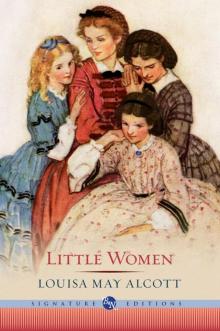 Little Women
Little Women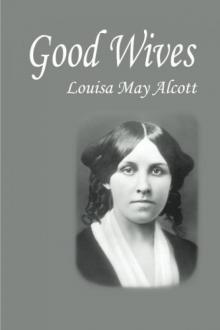 Good Wives
Good Wives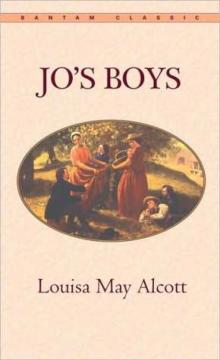 Jo's Boys
Jo's Boys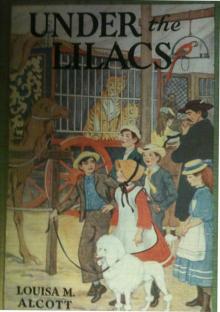 Under the Lilacs
Under the Lilacs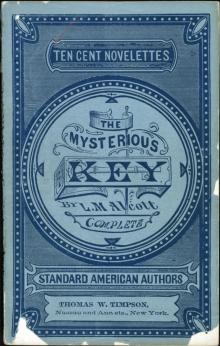 The Mysterious Key and What It Opened
The Mysterious Key and What It Opened The Inheritance
The Inheritance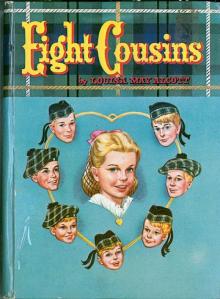 Eight Cousins
Eight Cousins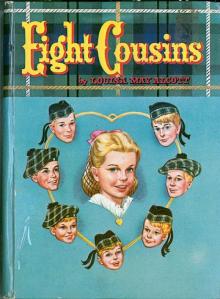 Eight Cousins; Or, The Aunt-Hill
Eight Cousins; Or, The Aunt-Hill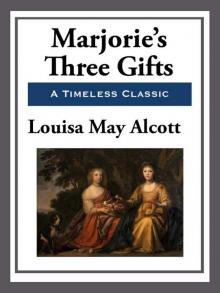 Marjorie's Three Gifts
Marjorie's Three Gifts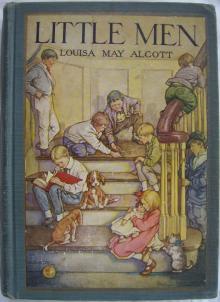 Little Men
Little Men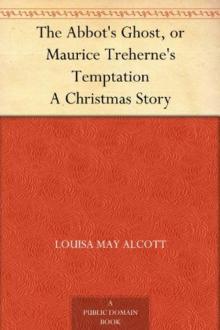 The Abbot's Ghost, or Maurice Treherne's Temptation: A Christmas Story
The Abbot's Ghost, or Maurice Treherne's Temptation: A Christmas Story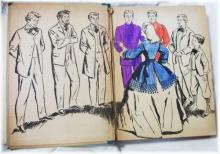 Rose in Bloom
Rose in Bloom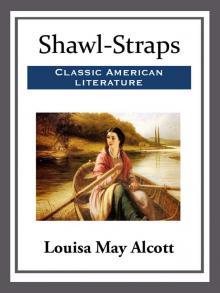 Shawl-Straps
Shawl-Straps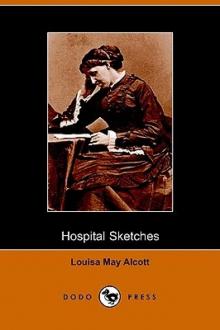 Hospital Sketches
Hospital Sketches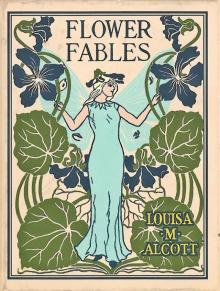 Flower Fables
Flower Fables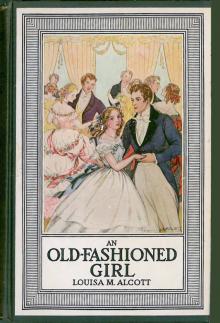 An Old-Fashioned Girl
An Old-Fashioned Girl The Candy Country
The Candy Country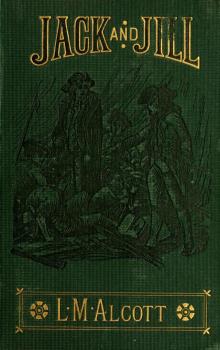 Jack and Jill
Jack and Jill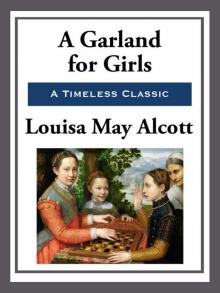 A Garland for Girls
A Garland for Girls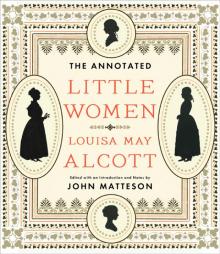 The Annotated Little Women
The Annotated Little Women A Classic Christmas
A Classic Christmas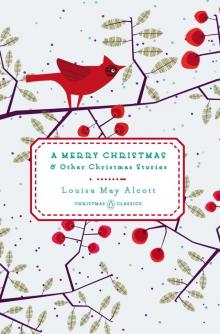 A Merry Christmas
A Merry Christmas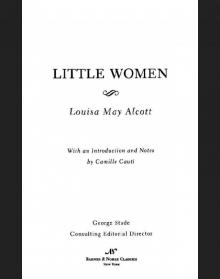 Little Women (Barnes & Noble Classics Series)
Little Women (Barnes & Noble Classics Series)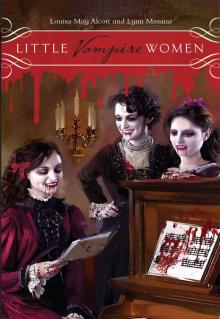 Little Vampire Women
Little Vampire Women